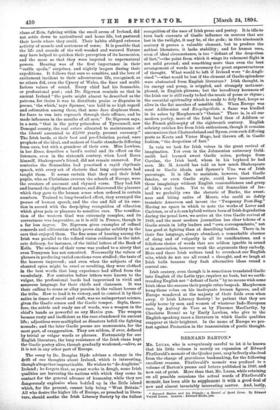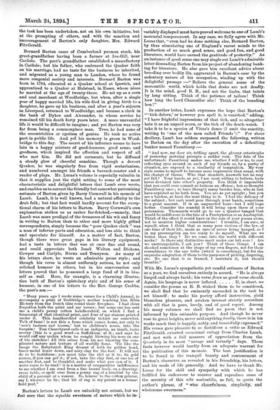BERNARD BARTON.*
MR. Lucas, who is scrupulously careful to let it be known that his little volume is merely an expansion of Edward FitzGerald's memoir of the Quaker poet, may be freely absolved from the charge of gratuitous bookmaking, for the following excellent reasons. FitzGerald's memoir was prefixed to a volume of Barton's poems and letters published in 1849, and now out of print. More than that, Mr. Lucas, while retaining on all possible occasions the actual words of FitzGerald's memoir, has been able to supplement it with a good deal of new and almost invariably interesting matter. And, lastly, • Bernard Barton and his Friends : a Record o f Quiet Lives. By Edward Verrall Lucas. London Edward Hicks. jun.
the task has been undertaken, not on his own initiative, but at the prompting of others, and with the sanction and
-encouragement of Barton's only daughter, Mrs. Edward FitzGerald.
Bernard Barton came of Cumberland yeoman stock, his great-grandfather having been a farmer at Ive-Gill, near Carlisle. The poet's grandfather established a manufactory in Carlisle; but his father, who embraced the Quaker faith on his marriage, had no taste for the business he inherited, and migrated as a young man to London, where he found more congenial society and interests. Bernard Barton was born in 1784, educated at a Quaker school at Ipswich, and apprenticed to a Quaker at Halstead, in Essex, whose niece he married at the age of twenty-three. He set up as a corn • and coal merchant at Woodbridge, but when, after a single year of happy married life, his wife died in giving birth to a daughter, he gave up his business, and after a year's sojourn in Liverpool, returned to Woodbridge, and became a clerk in the bank of Dykes and Alexander, in whose service he remained till his death forty years later. A more uneventful life it would be difficult to imagine ; and yet Barton was very far from being a commonplace man. True, he had none of the eccentricities or egotism of genius. He took no active part in public life. And yef his memory is green in Wood- bridge to this day. The secret of his influence seems to have lain in a happy mixture of good-humour, good sense, and goodness, which inspired the affection and respect of all who met him. He did not coruscate, bat he diffused a steady glow of cheerful sunshine. Though a devout Quaker, he was singularly free from rigid sectarianism, and numbered amongst his friends a barrack-master and a reader of plays. Mr. Lucas's volume is especially valuable in that it supplies just the right setting to some of the most characteristic and delightful letters that Lamb ever wrote, and enables us to correct the friendly but somewhat patronising estimate of Barton given by Barry Cornwall in his memoir of Lamb. Lamb, it is well known, had a natural affinity to the drab folk; but that fact would hardly account for the excep- tional charm of his letters to Barton. Barry Cornwall's own explanation strikes us as rather far-fetched,—namely, that Lamb was more prodigal of the treasures of his wit and fancy in writing to Barton than to other and more highly gifted correspondents, simply because the "poor Quaker clerk" was a man of inferior parts and education, and less able to think and speculate for himself. As a matter of fact, Barton, though there were great gaps in his literary equipment, had a taste in letters that was at once fine and sound, and could appreciate both Izaak Walton and Dickens, Cowper and Carlyle, Burns and Tennyson. As many of his letters show, he wrote an admirable prose style ; and though his verse is almost uniformly serious, he not only relished humour in others, but in his conversation and letters proved that he possessed a large fund of it in him- self as well. Here, for example, is a charming illustra- tion both of Barton's epistolary style and of his sense of humour, in one of his letters to the Rev. George Crabbe, the poet's son :-
"Many years ago I wrote some verses for a Child's Annual, to accompany a print of Doddridge's mother teaching him Bible History from the Dutch tiles round their fire-place. I had clean - forgotten both the print and my verses ; but some one has sent me a child's penny cotton handkerchief, on which I find a transcript of that identical print, and four of my stanzas printed under it. This handkerchief celebrity tickles me somewhat. Talk of fame ! is not this a fame which comes home, not only to men's business and bosoms,' but to children's noses, into the bargain! Tom Churchyard calls it an indignity, an insult, looks scorny (this is a good word—a Suffolkism] at it ; and says be would cuff any urchin whom he caught blowing his nose on one of his sketches ! All this arises from his not knowing the com- plicated nature and texture of all worldly fame. 'Tis like the image the Babylonish King dreamt of with its golden head, baser metal lower down, and miry clay for the feet. It will not do to be fastidious; you must take the idol as it is; its gold sconce, if you can get it; if not, take the clay feet, or one toe of another foot, and be thankful, and make what you can of it. I write verse to be read ! it is a matter of comparative indifference to me whether I am read from a fine bound book, on a drawing- room table, or spelt over from a penny rag of a kerchief by the child of a peasant or a weaver. So, honour to the cotton printer, say I, whoever he be; that bit of rag is my patent as a house-
• hold poet."
Barton's letters to Lamb are unluckily not extant, but we feel sure that the equable sweetness of nature which he in- variably displayed must have proved welcome to one of Lamb's mercurial temperament. In any case, we fully agree with Mr.
Lucas that, " even had he done nothing else, Bernard Barton, by thus stimulating one of England's rarest minds to the production of so much good sense, and good fun, and good literature, would have earned the gratitude of posterity." As an instance of good sense one may single out Lamb's admirable letter dissuading Barton from his project of abandoning bank- ing for literature. He also gave him excellent advice about brooding over bodily ills, aggravated in Barton's case by the sedentary nature of his occupation, winding up with the delightful passage :—" Believe the general sense of the mercantile world, which holds that desks are not deadly.
It is the mind, good B. B., and not the limbs, that taints by long sitting. Think of the patience of tailors ! Think how long the Lord Chancellor sits ! Think of the brooding hen !"
In another letter, Lamb expresses the hope that Barton's " tick-dolern,' or however you spell it, is vanished," adding, "I have frightful impressions of that tick, and so altogether hate it as an unpaid score, or the tick of the death-watch. I take it to be a species of Vitus's dance (I omit the sanctity, writing to one of the men called Friends ')." For sheer drollery, Lamb has seldom surpassed the following, written to Barton on the day after the execution of a defaulting banker named Fauntleroy :—
" And now, my dear sir, trifling apart, the gloomy catastrophe of yesterday morning prompts a sadder vein. The fate of the unfortunate Fauntleroy makes me, whether I will or no, to cast reflecting eyes around on such of my friends as, by a parity of situation, are exposed to a similarity of temptation. My very style seems to myself to become more impressive than usual, with the change of theme. Who that standetb, knoweth but he may yet fall ? Your hands, as yet, I am most willing to believe, have never deviated into other's property. You think it impossible that you could ever commit so heinous an offence ; but so thought Fauntleroy once ; so have thought many besides him, who at last have expiated as he hath done. You are as yet upright ; but you are a banker, at least the next thing to it. I feel the delicacy of the subject ; but cash must pass through your hands, sometimes to a great amount. If in an unguarded hour—but I will hope better. Consider the scandal it will bring upon those of your persuasion. Thousands would go to see a Quaker hanged that would be indifferent to the fate of a Presbyterian or an Anabaptist. Think of the effect it would have on the sale of your poems alone, not to mention higher considerations ! I tremble, I am sure, at myself, when I think that so many poor victims of the law, at one time of their life, made as sure of never being hanged, as I in my presumption am too ready to do myself. What are we better than they ? Do we come into the world with different necks ? Is there any distinctive mark under our left ears ? Are we unstrangulable, I ask you ? Think of these things. I am shocked sometimes at the shape of my own fingers, not for their resemblance to the ape tribe (which is something), bat for the exquisite adaptation of them to the purposes of picking, fingering, etc. No one that is so framed, I maintain it, but should tremble."
With Mr. Lucas's sympathetic yet candid estimate of Barton as a poet, we find ourselves entirely in accord. " He is always limpid and always lucid; his verse flows as good verse should.
Again, his language is never inflated If, in short, we consider the poems as B. B. wished them to be considered, we shall find that he eminently succeeded in the task he set himself : to make his poetry afford instruction, yield blameless pleasure, and awaken interest strictly accordant with all that is pure, lovely, and of good report. Among his many volumes we shall find no poem that is not informed by this estimable purpose. And though he never rose to great heights, never said anything finally, there is in his works much that is happily, nobly, and beautifully expressed." His verses gave pleasure to so fastidious a critic as Edward FitzGerald, extorted occasional eulogy from Charles Lamb, and met with a fall measure of appreciation from the
Quarterly in its most " savage and tartarly " days. These facts however would hardly form an adequate warrant for the publication of this memoir. The beat justification is to be found in the tranquil beauty and contentment of Barton's character, as revealed in his friendship, his letters, and his mode of life generally. • And we have to thank Mr. Lucas for the skill and sympathy with which he has fulfilled his endeavour to recover and reproduce some of the serenity of this vita umbratilie, so full, to quote the author's phrase, of " wise cheerfulness, simplicity, and wholesome sweetness."



































 Previous page
Previous page